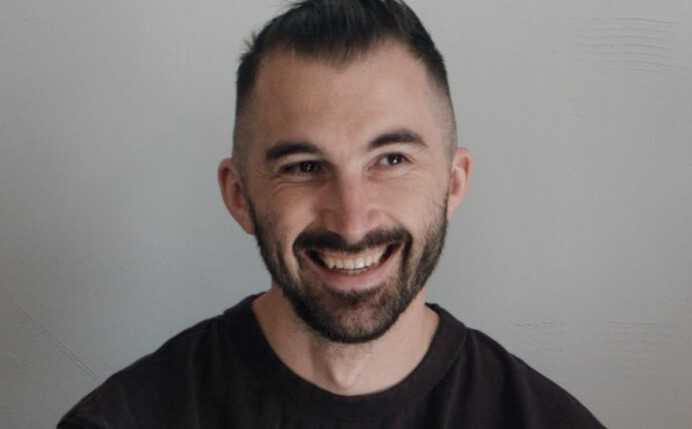MILAN – Specialty coffee has reached Romania, where it has been growing for several years thanks to the drive of a few passionate entrepreneurs who wanted to rewrite the history of the sector with quality and professionalism. To talk about the Romanian scene, we spoke to Bogdan Ciocian, founder of one of the biggest specialty coffee chains in Transylvania: Meron Coffee.
From Cluj, conquering the country and beyond.
Let’s talk about how it all started: with Meron Coffee, you brought the speciality to Transylvania. What was the idea that pushed you onto the third wave?
“When we started 8 years ago, there was only one other shop in our city. We were based in the second biggest city after Bucarest, Cluj. It’s one of the most emerging cities in Romania and Eastern Europe: there are a lot of investment and entrepreneurial projects, also because it’s a university city. Here is a very young and dynamic place.
When we opened, for people was a little bit difficult to understand what specialty coffee means, and that it was not only fresh roasted beans. They now started to know that it means also sourcing coffee from farmers that hand-pick the drupes, and the chain between farmers and customers is shorter. Specialty coffee is an entire universe that you need to discover and understand to appreciate it.
I’ve been to Bucarest a couple of times before opening Meron, visiting small coffee shops there. I knew that their product was different because it tasted differently. I felt the coffee was unique in confront to other coffee branded as illycaffè. Italian brands for a very long time had a good presence in Romania, especially between 1990 and 2015, when Italian roasters managed to develop the market with their products. After that, specialty coffee brands started to open more and more shops and many concepts.
After this discovery of new profiles and flavors, form me it was interesting to take something similar in Cluj. When we found the first location, we decided that it would be a specialty coffee shop.
To be honest, when at first found the building, we were more attracted by its architecture, but without being sure whether to open a coffee shop. The unique architectural style, rarely you can find it in this part of the wall and Transylvania because is related to the south part of Romania that lives in 17th century. This is the only building with this design.
Only in a second moment, we chose to transform the space into a specialty coffee shop. This is how Meron started: I told to my friend that was interested to manage it and to go through the project together. It was a good spot for a coffee shop. I started with 10 thousand euros: it wasn’t enough, only the espresso machines and two grinders cost more than that. We called some other friends and eventually, we could open Meron Coffee. The first investment was 67 thousand euros and that’s how we got till today.”
How many Meron Coffee outlets have you opened, how many staff and what turnover have you achieved?
“Now we are in ten cities, 21 shops. We’re opening another one in Budapest in April. We have some other projects related to coffee shops that we are planning. But I’m not interested in the number though: for us is more important to grow organically. We do have not a specific target or goals to achieve.
Meron Coffee is more interested to build a community, something that is not pumped, but that can grow day by day. Our business is based on services, not only on products. We don’t use a lot of offers, or campaigns: we are more based on a creative brand, a philosophy, or a mood.
If you’re thinking about a bigger brand like Apple, they never build their growth and company around sales and stuff like that. They always think about values, products that represent more about the culture, and the idea of how things should be. Meron is the same: we don’t run after customers, but we want to do things in our way and people could relate and follow us because of that.”
Where do you source and roast your coffees?
“Since 2019 we started to roast. At the beginning we worked with a roaster standing in Bucarest, where I’ve drunk the first specialty. For one year we did this way. Then, after 2 years we worked with a local roastery because it was easier to manage logistic issues. In that way we best understood what kind of coffees we would like to have.
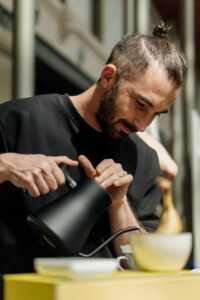
In 2019 we developed our roastery: this year will be the next step in the history of the roastery, we are going to move it to a bigger warehouse this April. This will be important because the new facilities will help us to optimize the storage area and the processes inside the roastery.
Regarding sourcing: we have two kinds of routes. One: we source directly from some origins. Every year we go to Panama, Colombia, and sometimes Brazil, especially for the expensive, nano, and micro-lots, we should build direct contact with farmers. We can cup, taste the coffee and immediately find a good bean and make it booked and sent when it’s ready.
The other way is working with traders in Europe. They have some warehouses in cities like Amburg, and Amsterdam, and the connections from the ports make it possible to directly send them to our roastery. We never accept more than one trader between us and the farmers: the more traders you find in the chain, the less money the farmers will get. That’s why we only allow one trader in this network. In the beginning, it was a challenge, but now many coffee traders can offer this connection.
They do a good job, even if some are very small and others are very big, we interacted with them during the events and Fairs, to test their philosophy and how much they pay the farmers. For example: let’s say we’re paying 10 euros for a kilogram of green coffee, if the traders pay only 5 euros to the farmers, then we don’t consider it to be fair.
We think that of the price of green coffee, 80% of that should go to the farmer, who is taking most of the risk, of the hard work during the years, so he should get the most of the coffee price for a kilogram. The trader should have around 20% in commission but not more than that.
Sometimes if they’re big they try to pay the farmers less than we want to. Some other times they find roasteries that pay a little more than the coffee really costs. We worked with very professional traders: the advantage is that they always care about some aspects that for us are more difficult, such as logistics, storage, and doing medical tests for different kinds of goods. It’s always mandatory in UE to do these tests, and they can handle those exams.
In general, we’re buying coffee from Panama, Costa Rica, El Salvador, and Colombia. Colombian farmers represent around 40% of our coffees. Brasil of course is an important part of our basic origins. We’re importing and roasting those coffees that we can use with milk, and with automatic machines for the consumers at their homes. They’re very stable and consistence. Besides that, we’re working with coffees from Bolivia, Ecuador, and in Africa Ethiopia, and Kenya.”
The commerce and the logistic from Ethiopia is a more difficult?
“In Africa, we’re working mostly through traders, because for example, if you find 1hundred kilos of an amazing coffee in Colombia or Panama, it is simpler to put it from there on a plain and make it arrive in Europe.
Instead, when we’re talking about African countries, 99% of the time we have to get our coffee through ship containers and so we can’t afford an entire container for only 1 hundred kilograms. It’s mandatory to buy from Ethiopia and Kenya bigger amounts of coffee. Traders are putting together 3 hundred bags of coffee for different roasters in the same containers and they send them to Europe: they will supply more than 20 roasteries.
Otherwise, it would be very difficult to source coffee from those places. It’s not impossible, but generally, you have to ship it through containers and to do it, you have to rely on traders.
In a container you can find 3 hundred bags of coffee, which means 20 tons: not all the roasteries are specialty ones, so you need to split the big quantity between different companies. Another origin we’re buying from is Indonesia: every year we source 2/3 of coffees from there.”
How has the specialty scene in Romania evolved since you started until today?
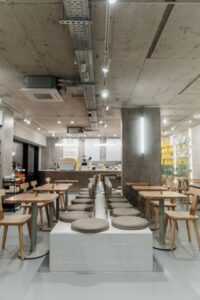
“When we started in 2015, the concept of specialty coffee shops was like Orso Nero in Milano: it’s supposed to have 15 square meters, very small, 2/3 tables, the barista most of the time is the owner of the coffee shop. A specialty coffee chain at the time was misjudged by people because they don’t recognize it as a specialty shop.
Now, 8 years later, people understand that even if the industry is small, there can be many kinds of concepts. There are still the small ones, but also some chains that are trying to develop without renouncing quality. When we started there were like 10/12 important brands overall in Romania, 6/7 good roasteries.
Now the puzzle is huge: there are more than 200-250 specialty coffee brands, above all based in Bucarest, and after that, is Cluje. Meron is in a lot of cities and we had the opportunity to grow very fast. Now we’re handling 250 baristas, a lot of coffees that we’re roasting every day, sometimes on Saturdays. The next competitors have 2/3 shops. In Bucarest now there are 23 important brands and maybe another 20/40 that are trying to do good things.
Cluj has 12-13 very good roasteries and shops. It’s important to say that in Romania if you’re going to any city you will still find a good coffee shop. It happened because, during the pandemic, a lot of baristas came back to smaller cities. After all, they lost their job and couldn’t affort to live in big cities anymore and so they started their own specialty coffee business there.
And then, there is a second reason: the Romanian government has a program every year that supports 10-12 thousand startups with an amount of money that it’s not refundable and the businessmen don’t have to give it back.
So every year there are like 10 thousand startups that can apply for a budget of 44 thousand euros to open their new business: among them, there are a lot of people that want to start a coffee shop. It’s easier because you have to invest less money by yourself. It’s an important part of a starting budget. A lot of baristas and roasters have taken advantage of this program.
Those are the factors that today we have a lot of coffee shops serving good specialty in every city in Romania.”
Now what kind of coffees and extractions are most popular in Romania?
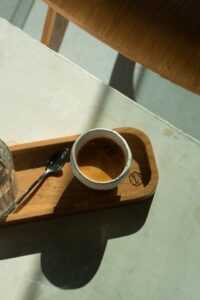
“It’s the same in Romania as in Italian, because of the Italian heritage and brands that developed a culture around the cup here. After the revolution of 1989, the brands had the capability, and the resources, to start a market here, so for them was easier to start distributing their coffee and they were the main brands. So it’s an espresso-based culture in Romania. Only now filter coffee is gaining space in the bigger cities, where 10% of the customers are drinking it and it’s growing, when 5 years ago the percentage was about 1-2%.
The education of baristas helped a lot and they love making filters, so they recommend it to customers when they ask something like an American. Some customers accept the challenge. This kind of strategy helps, with the curiosity toward a different menu. A third thing: filter coffee seemed like a cool drink to order. They’re copying the habbit for that reason.”
Is the price a problem there, in Meron, in Romania?
“In Romania now an espresso costs from 2 to 3 euros. Cappuccino is between 2.20 to 3.50 euros. People don’t complain. In Meron Coffee espresso is 2.20 euros, cappuccino is 3 euros and a filter coffee is 5.”
Meron Coffee: how much does espresso cost, what coffee do you serve, what machines do you use?
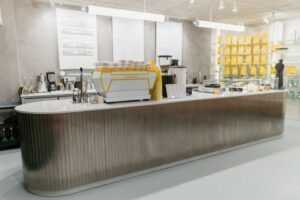
“We use only La Marzocco, KB90. We use it because it’s stable, reliable. As grinder we use Malkohenig for espresso and filter coffee. “
How is the figure of the barista seen there? Is he a professional or, as in Italy, is he still a figure considered almost marginal?
“It is a profession, but not a long-term one. At age of 20 to 30 is difficult to do it longer than that, because you have to confront back pain or some medical issues. Most of our baristas go from 20 to 30 years and we teach them the job. Meron coffee has a lot of training modules and workshops. Every Friday we have the training, and we get a lot of coffee conferences, and retreats in the mountains to talk about coffee. We are going to many coffee events, from cupping to competitions. Meron is a good environment for baristas to learn and grow. You just have to take advantage of those opportunities.”
What are the biggest challenges you face with Meron Coffee?
“The main difficulty is finding personal resources. I’m traveling a lot in many countries, also to Coffee Dubai Festival, and then to Paris and Amsterdam: every time people in our industry share the same issue. We can’t find a very interested and specialized barista. The quality of professionals in the industry it’s lower and lower every year. Because a lot of people want only to make barista not for passion but to pay their rent. This is one of the biggest challenges for Meron.
Another one is the lack of predictability of what is going to happen next year. What we learned during the pandemic is that we have to manage three challenges: one it was the pandemic, then the war, and finally the raise in the cost of living and inflation. We need to be able to adapt very quickly to the economic environment.
If we could say that the next 6 years will be of growth and stability, it would be amazing, but simply we can’t. We need to be adaptive, to be able to change very fast according to the situation. All this without losing the soul of the company, even if the prices rise (it’s 7 dollars now 11-12, for Ethiopian good coffee) to keep the quality very high.
We thought about the idea of specialty coffee capsules, we also went to Italy to see how it could work. We’re processing the pieces of information, gathering datas, and maybe in 2024 we’re going to produce them.”
Bogdan concludes with an important message: “The purpose of building the Meron brand was always to realize a Transylvanian brand that stands something in the coffee industry all over the world. A brand that is doing an amazing job there. Because there’s a prejudice against Romanian companies, but we want to prove that this country can create amazing things.
Romanian are hard-working people and very creative: this combination is one of the most important ones. We have to work with our mentality, we want Meron to be that kind of example that can inspire other Romanians and can tell our story in other countries. Besides the passion for coffee, regarding the brand, this is the philosophy behind it. That’s why we’re traveling for a lot of events, coffee farms, festivals, to develop our identity as professionals.”




